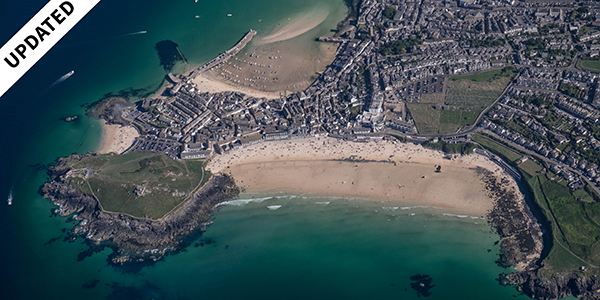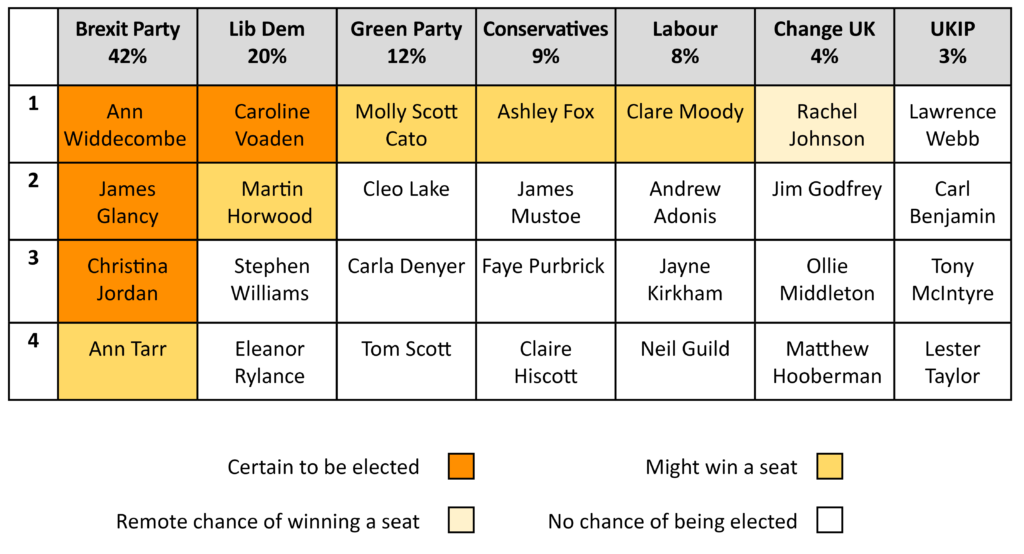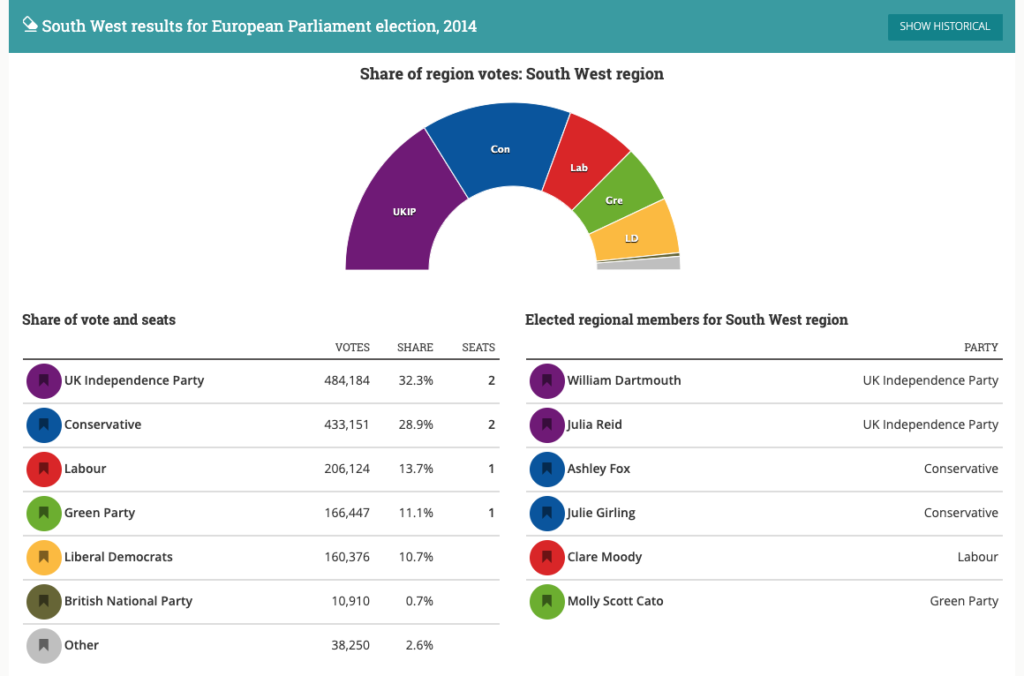European elections 2019: what will happen in England’s South West?
In recent years the South West of England has become a Conservative stronghold, as the opposition from the Liberal Democrats in rural areas dwindled, restoring an older pattern of Labour challenging from the few big cities like Bristol, Plymouth and Exeter. However, in European Parliament elections, UKIP came first in 2014, winning two of the region’s six seats, and helping shape a strong Leave vote in the 2016 Brexit referendum – an inheritance that now falls to the Brexit Party. With regional Conservative support now at unprecedentedly low levels, the three strong pro-Remain parties are vying to get two seats between them. With voters able to cast only a single vote for a party list, the Democratic Audit team reviews likely outcomes and the main potentially electable candidates.

St Ives, Cornwall. Photo by Malcolm Lightbody on Unsplash
Note: This article was first published on 18 May and updated on 20 May to take into account the latest regional polling data.
The South West region spans across Bristol, Gloucestershire, Wiltshire, Somerset, Dorset, Devon and Cornwall, plus the overseas territory of Gibraltar. With several high-profile celebrity candidacies competing, the region has attracted greater than usual media attention. The Conservatives’ past lock on electoral success here was squeezed in previous European Parliament elections, culminating in 2014, when UKIP won 32% to the Tories’ 29%, though both parties picked up two seats.
The new Brexit Party has inherited almost all the past UKIP voters and seems to have cannibalised much of the Conservative vote share too. Figure 1 shows that in the latest poll from YouGov Farage’s party had 42% (gaining 8% on early May polls in the South West, such as that from ComRes). It will certainly gain three seats and potentially a fourth, depending on the exact percentage it gets and those of other parties. Ann Widdecombe, a former Conservative minister (and Strictly Come Dancing contestant), heads their list and is guaranteed to win a seat.
There are some strong indications are that a national Lib Dem surge will reap rewards for the party in the South West, where they have historically been strong. They regularly elected MEPs before their 2014 rout. The latest polling has them leapfrogging Labour, the Conservatives and Greens into second place on 20% (up from 13% a few weeks ago and 10% in 2014). This would guarantee them one seat and give them an outside chance of a second.
Their strong pro-Remain competitors are the Greens, who won the region’s final seat with 11% support in 2014. The YouGov poll puts them on 12%, and so with a good chance of retaining this seat. This poll just gives the Greens the edge for winning the fifth or sixth seat (although earlier ones were less favourable). The party also has the advantage of an incumbent and relatively well known MEP in Molly Scott Cato.
Earlier competition for Remain votes from the new Change UK/The Independent Group seems to be slipping away, and they currently are polling 4% with little chance of a seat. Their lead candidate is Rachel Johnson (a well-known journalist and also Boris Johnson’s sister). However, given the small samples in regional polls, and a high level of polling volatility in recent weeks, the exact standing of these smaller parties is especially hard to judge.
Neither of the national top two Westminster parties is doing well. Both Conservatives and Labour may be losing Remainer support to the Lib Dems or the Greens, which both take an unambiguous Remain line, as well as support to the Brexit Party. The Conservatives languish on just 9% in Figure 1, and on this basis must lose one and quite likely both of their seats. Labour’s prospects have also dropped rapidly, falling from third place and 14% in 2014 to fifth place, polling at only 8% (although other recent polls have shown their vote share holding up better). Their incumbent MEP Clare Moody heads their list and has only a slim chance of being re-elected. Lord Andrew Adonis (an arch-Remainer and supporter of a second referendum) looks to have no chance of being elected.
Finally UKIP itself has just 3% support and no chance of a seat. Their second-placed candidate is the social media provocateur Carl Benjamin, who has been banned from most social media for making unpleasant rape jokes targeting female MPs, attracting considerable press and public condemnation. He has no chance of being elected, but may have helped hasten his party’s total demise.
All the parties have cluttered up the ballot paper with eight candidates each, though the lower ranked ones cannot possibly win a seat under proportional representation – we show only a few of them (the white cells in Figure 1), and not the no-hope candidate names listed lower on each party’s list. Voters can only vote for a single party list, not specific candidates, and mark a single X on the ballot paper. In making up their minds which party list to support, voters need only pay attention to the candidates in the shaded boxes here.
Figure 1: Main party candidates in the South West (with YouGov polling data 8–17 May) and possible winners (six seats)N

To find details of all the local candidates, and to locate your polling station, visit our Democratic Dashboard site and enter your postcode. The site also has full details of other recent elections in your local area.
Below we list a summary of any candidate in Figure 1 with some chance of being elected, and point you to their social media sites, which can show something of what each candidate is like as a person. At the bottom of this article we also show the full 2014 results for the South West.
Which candidates could be elected in the South West in 2019?
THE BREXIT PARTY has fielded a list headed by some high-profile candidates, strengthening their assured chance of winning three seats, and perhaps even four on a good surge day.
- Ann Widdecombe was Conservative MP for a constituency in Maidstone from 1987 to 2010, and served in several ministerial roles in John Major’s government, including as Minister for Prisons. (For a summary of her Commons’ voting record, look here.) She is known for holding strongly socially conservative views. Since leaving politics she has appeared on numerous television shows, and in pantomime.
- James Glancy (Twitter: @jaglancy) is a former Royal Marine and Special Boat Service officer who served in Afghanistan. He is also an environmental campaigner and presenter of Discovery’s ‘Shark Week’ programme.
- Christina Jordan is a former nurse, airline attendant, and charity worker. You can read an interview with her here.
- Ann Tarr is a financial consultant and school governor. You can read her CV here.
LIBERAL DEMOCRATS – Until 2014, the Lib Dems regularly returned MEPs to the European Parliament from the South West. On current polling, they have a very good chance of getting one elected again, and could get a second.
- Caroline Voaden (Twitter: @CarolineVoaden) is a former Reuters journalist, who has worked for charities and run her own business. You can read her full biography here.
- Martin Horwood (Twitter: @MartinChelt) was MP for Cheltenham from 2005 until 2015 and is currently a councillor for Leckhampton.
GREEN PARTY – The Green Party (just) won the region’s last seat in 2014, and their incumbent has a strong chance of retaining it.
- Molly Scott Cato (Twitter: @MollyMEP) has been a Brussels MEP for the South West since 2014 and spokesperson on Brexit for the Green Party of England and Wales. For her EP profile and voting record see here. She was previously an economist and academic at the University of Roehampton.
CONSERVATIVES – Their recent regional dominance has not been enough to insulate them in this election. Although they may hold one of their existing seats, on the latest polling any more will be out of their reach.
- Ashley Fox (Twitter: @Ashleyfoxmep) was first elected to the European Parliament in 2009, and was leader of the Conservatives’ group there. For his voting record see his Votewatch.eu profile. Before going to Brussels he was a local councillor in Bristol and a solicitor.
- James Mustoe (Twitter: @JamesMustoe1) is a councillor for Mevagissey in Cornwall, and manages the constituency office for St Austell and Newquay MP Steve Double.
LABOUR look to have a chance of retain their current seat, but with their numbers falling fast in the latest polls, they are unlikely to get enough support to win another one.
- Clare Moody (Twitter: @ClareMoodyMEP) was elected MEP in 2014 (reversing a complete fail for Labour in 2009). For her voting record in the Brussels parliament see her Votewatch.eu profile. She sits on committees covering defence, foreign affairs, industry, and women’s rights. She previously worked as an official for the trade union Unite.
- Andrew Adonis (Twitter: @Andrew_Adonis) was a political advisor to Tony Blair, and was made a Labour peer in 2005 when he joined the government as a junior minister, first for education and then transport. Since the referendum he has been a vocal pro-European campaigner in the People’s Vote campaign, and is vice-Chair of the European Movement.
CHANGE UK – The new party of former Labour and Conservative MPs is pushing hard in this region, but has slipped in recent polls and seems like a long shot for a seat.
- Rachel Johnson (Twitter: @RachelSJohnson) is a journalist, and the former editor of The Lady magazine. She was a supporter of the Lib Dems at the 2017 election. She is part of the Johnson political clan: her brothers are the Conservative MPs Boris and Jo Johnson.
UKIP – The party looks likely to plummet from first to last place, perhaps aided by the highly controversial Carl Benjamin in second place on their list. Even their lead candidate below has no chance of success.
- Lawrence Webb (Twitter: @LawrenceJWebb) works as an assistant to the UKIP leader Gerard Batten. He was UKIP’s London mayoral candidate in 2012.
Figure 2: 2014 European Parliament results for the South West and MEPs

Source: Democratic Dashboard. Order elected and current status: 1. William (The Earl of) Dartmouth (elected as UKIP, now Independent); 2. Ashley Fox (Conservative); 3 Julia Reid (elected as UKIP, now Brexit Party); 4 Julie Girling (elected as Conservative, now Independent); 5 Clare Moody (Labour); 6 Molly Scott Cato (Green).
Read more about how the European Parliament elections work:





 Democratic Audit's core funding is provided by the Joseph Rowntree Charitable Trust. Additional funding is provided by the London School of Economics.
Democratic Audit's core funding is provided by the Joseph Rowntree Charitable Trust. Additional funding is provided by the London School of Economics.
[…] 'undefined')jQuery('div.switcher div.selected a').html(lang_html.replace('data-gt-lazy-', ''));}}); European elections 2019: what will happen in England’s South West? Democratic Audit […]
Like the last one of these pieces, why are you using just one out of date opinion poll when there have been so many developments and changes since? The comres poll you refer to has been superseded by a number of polls since. What is even more odd is that the out of date poll you refer to (they started questioning 18 days ago) is noted by polling organisations as not so representative of other polls because it gives Labour a much higher average share of the vote. It does not mean an outlier is wrong, but as it’s been passed by other polls and there has been comment on staistical variations, then the whole premise of your piece is inaccurate and the research invalid. Sorry but that is just the case…
To make this work, re-do it and feature the other polls and the statistical variations. I have done this with some of the polls btw and the variations are fascinating. They throw up, also, some interesting failures (in true PR terms) of the system as it is applied in the UK. Particularly since the re-allocation (reduction in numbers) in UK seats a couple of elections back.
If you have a better poll, please share it – your post isn’t much use otherwise